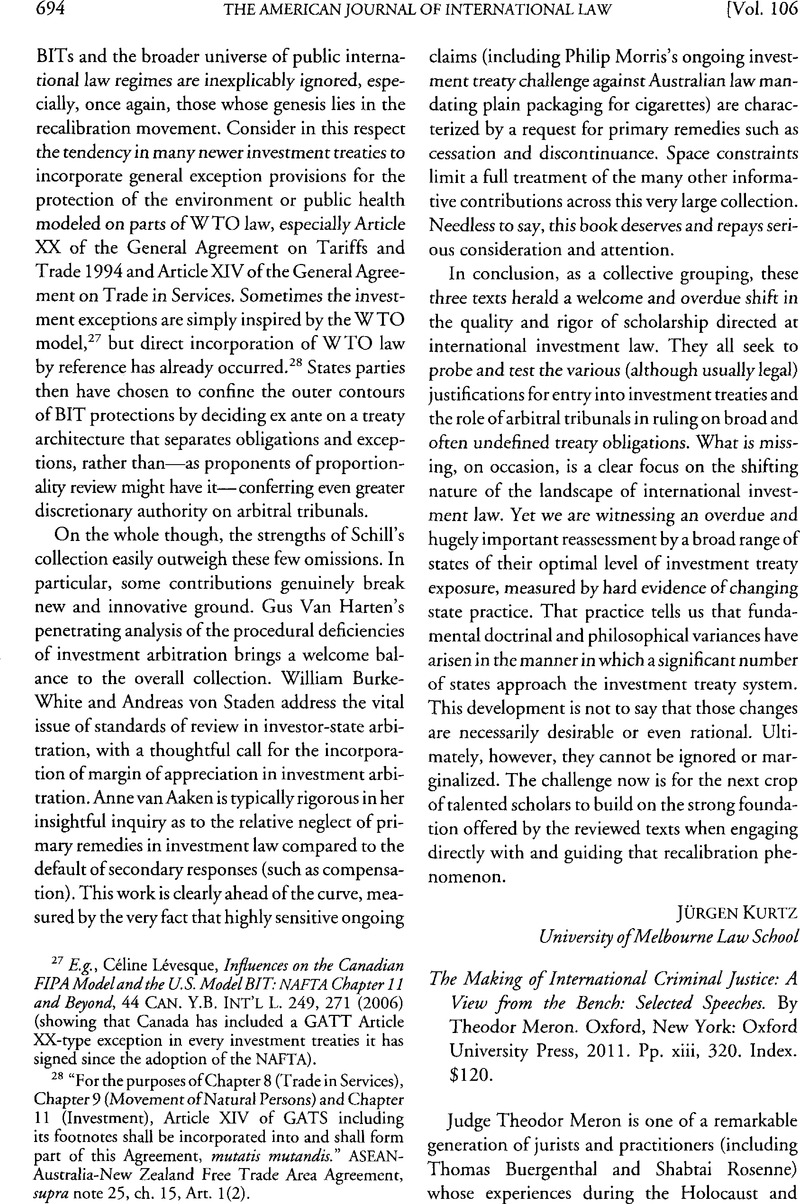No CrossRef data available.
Article contents
The Making of International Criminal Justice: A View from the Bench: Selected Speeches. By Theodor Meron. Oxford, New York: Oxford University Press, 2011. Pp. xiii, 320. Index. $120.
Published online by Cambridge University Press: 20 January 2017
Abstract

- Type
- Recent Books on International Law
- Information
- Copyright
- Copyright © American Society of International Law 2012
References
1 Information about Judge Meron is available on the ICTY’s website, http://www.icty.org/sid/l49.
2 See, e.g., Michael J. Matheson, Council Unbound: The Growth of UN Decision Making on Conflict and Postconflict Issues after The Cold War 200-08 (2006); John Hagan, Justice in the Balkans: Prosecuting War Crimes in the Hague Tribunal (2003); Virginia Morris & Michael P. Scharf, An Insider’s Guide to the International Criminal Tribunal for the Former Yugoslavia (1995); Murphy, Sean D., Progress and Jurisprudence of the International Criminal Tribunal for the Former Yugoslavia, 93 AJIL 57 (1999)CrossRefGoogle Scholar; Accountability for Atrocities: National and International Responses (Jane E. Stromseth ed., 2003); William A. Schabas, The UN International Criminal Tribunals: The Former Yugoslavia, Rwanda And Sierra Leone (2006).
3 Military and Paramilitary Activities in and Against Nicaragua (Nicar. v. U.S.), 1986 ICJ Rep. 14 (June 27).
4 Rome Statute of the International Criminal Court, July 17, 1998, 2187 UNTS 90 [hereinafter ICC Statute].
5 Application of the Convention on the Prevention and Punishment of the Crime of Genocide (Bosn. & Herz. v. Serb. & Mont.), Judgment, 2007 ICJ Rep. 43 (Feb. 26).
6 Prosecutor v. Tadić, Case No. IT-94-1-AR72, Appeal on Jurisdiction (Oct. 2, 1995), available at http://www.icty.Org/x/cases/tadic/acdec/en/51002.htm.
7 See Richard Holbrooke, To End a War 190 (1999). Holbrooke, the U.S. negotiator of the Dayton Accords, called the tribunal “a valuable instrument of policy” in the efforts to bring the Bosnian conflict to a conclusion. Id.
8 For example, the statute of the Yugoslav tribunal gives it broad jurisdiction over all violations of “the laws and customs of war,” which has enabled it to be innovative and expansive, particularly with respect to noninternational conflict. Statute of the International Criminal Tribunal for the Former Yugoslavia, Art. 3, SC Res. 827, annex (May 25, 1993), 32 ILM 1203 (1993) [hereinafter ICTY Statute]. By comparison, the ICC Statute defines offenses in considerable and restrictive detail and seems to be more limited in some respects. For example, it gives jurisdiction in international conflicts over the use of unlawful weapons and over attacks causing disproportionate civilian injury (Article 8(2)(b)), but does not give such jurisdiction in noninternational conflicts (Article 8(2)(e)). ICC Statute, supra note 4, Arts. 8(2)(b), 8(2)(e).
9 Although the Yugoslav and Rwanda tribunals have been criticized for being too remote from affected populations, they are at least located on the same continent as the affected populations in each case and have been able to focus exclusively on the specific conflict in question, which is not the case for the ICC.
10 The ICTY originally faced obstruction from the Serbian and Croatian governments, but both are now reasonably cooperative. The Rwandan government initially had problems with some aspects of the ICTR’s founding statute but has basically cooperated with its operations. In comparison, the ICC faces outright opposition from Sudan and potential resistance from other African governments.
11 By contrast, the Security Council used its mandatory Chapter VII powers to require all UN members to cooperate with the Yugoslav and Rwanda tribunals, and UN peacekeeping personnel have conducted arrests of some of the Yugoslav indictees under the Security Council’s authority.
12 The Court must defer to national prosecution unless the prosecuting state “is unwilling or unable genuinely to carry out the investigation or prosecution.” ICC Statute, supra note 4, Art. 17. In contrast, the Yugoslav tribunal has primacy over national courts, as does the Rwanda tribunal. ICTY Statute, supra note 8, Art. 9; Statute of the International Tribunal for Rwanda, Art. 8, SC Res. 955, annex (Nov. 8, 1994), 33 ILM 1602 (1994).


